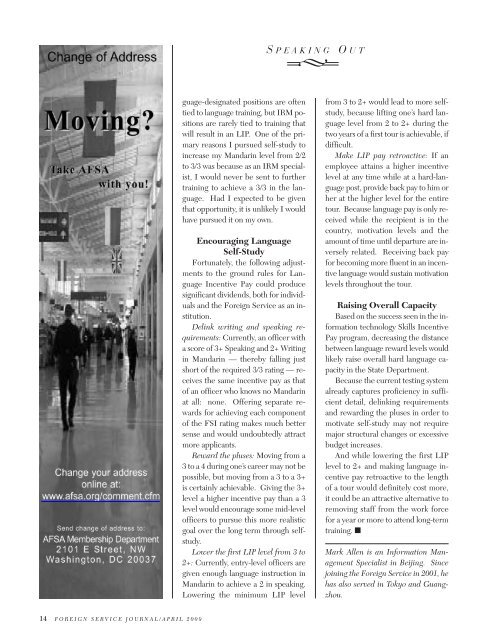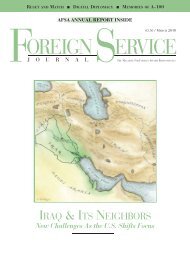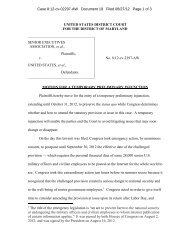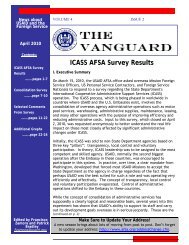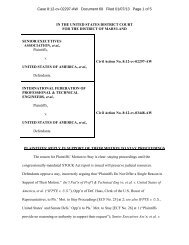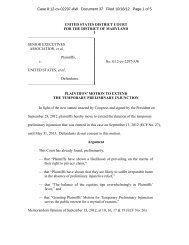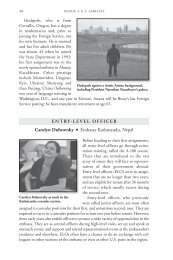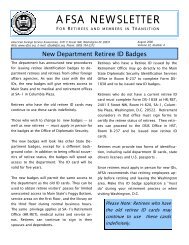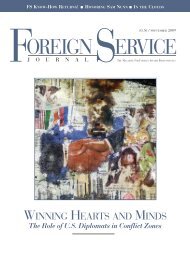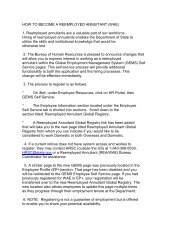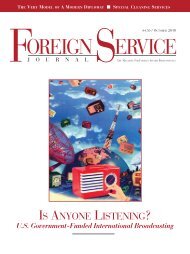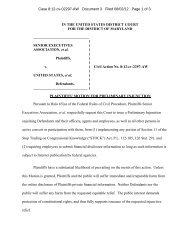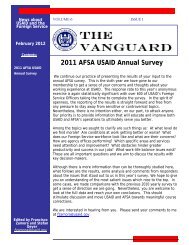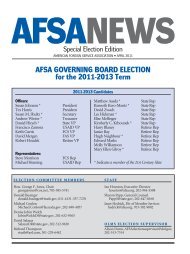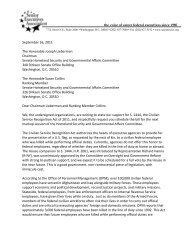F OCUS - American Foreign Service Association
F OCUS - American Foreign Service Association
F OCUS - American Foreign Service Association
Create successful ePaper yourself
Turn your PDF publications into a flip-book with our unique Google optimized e-Paper software.
S P E A K I N G<br />
<br />
O U T<br />
guage-designated positions are often<br />
tied to language training, but IRM positions<br />
are rarely tied to training that<br />
will result in an LIP. One of the primary<br />
reasons I pursued self-study to<br />
increase my Mandarin level from 2/2<br />
to 3/3 was because as an IRM specialist,<br />
I would never be sent to further<br />
training to achieve a 3/3 in the language.<br />
Had I expected to be given<br />
that opportunity, it is unlikely I would<br />
have pursued it on my own.<br />
Encouraging Language<br />
Self-Study<br />
Fortunately, the following adjustments<br />
to the ground rules for Language<br />
Incentive Pay could produce<br />
significant dividends, both for individuals<br />
and the <strong>Foreign</strong> <strong>Service</strong> as an institution.<br />
Delink writing and speaking requirements:<br />
Currently, an officer with<br />
a score of 3+ Speaking and 2+ Writing<br />
in Mandarin — thereby falling just<br />
short of the required 3/3 rating — receives<br />
the same incentive pay as that<br />
of an officer who knows no Mandarin<br />
at all: none. Offering separate rewards<br />
for achieving each component<br />
of the FSI rating makes much better<br />
sense and would undoubtedly attract<br />
more applicants.<br />
Reward the pluses: Moving from a<br />
3 to a 4 during one’s career may not be<br />
possible, but moving from a 3 to a 3+<br />
is certainly achievable. Giving the 3+<br />
level a higher incentive pay than a 3<br />
level would encourage some mid-level<br />
officers to pursue this more realistic<br />
goal over the long term through selfstudy.<br />
Lower the first LIP level from 3 to<br />
2+: Currently, entry-level officers are<br />
given enough language instruction in<br />
Mandarin to achieve a 2 in speaking.<br />
Lowering the minimum LIP level<br />
from 3 to 2+ would lead to more selfstudy,<br />
because lifting one’s hard language<br />
level from 2 to 2+ during the<br />
two years of a first tour is achievable, if<br />
difficult.<br />
Make LIP pay retroactive: If an<br />
employee attains a higher incentive<br />
level at any time while at a hard-language<br />
post, provide back pay to him or<br />
her at the higher level for the entire<br />
tour. Because language pay is only received<br />
while the recipient is in the<br />
country, motivation levels and the<br />
amount of time until departure are inversely<br />
related. Receiving back pay<br />
for becoming more fluent in an incentive<br />
language would sustain motivation<br />
levels throughout the tour.<br />
Raising Overall Capacity<br />
Based on the success seen in the information<br />
technology Skills Incentive<br />
Pay program, decreasing the distance<br />
between language reward levels would<br />
likely raise overall hard language capacity<br />
in the State Department.<br />
Because the current testing system<br />
already captures proficiency in sufficient<br />
detail, delinking requirements<br />
and rewarding the pluses in order to<br />
motivate self-study may not require<br />
major structural changes or excessive<br />
budget increases.<br />
And while lowering the first LIP<br />
level to 2+ and making language incentive<br />
pay retroactive to the length<br />
of a tour would definitely cost more,<br />
it could be an attractive alternative to<br />
removing staff from the work force<br />
for a year or more to attend long-term<br />
training. ■<br />
Mark Allen is an Information Management<br />
Specialist in Beijing. Since<br />
joining the <strong>Foreign</strong> <strong>Service</strong> in 2001, he<br />
has also served in Tokyo and Guangzhou.<br />
14 F O R E I G N S E R V I C E J O U R N A L / A P R I L 2 0 0 9


